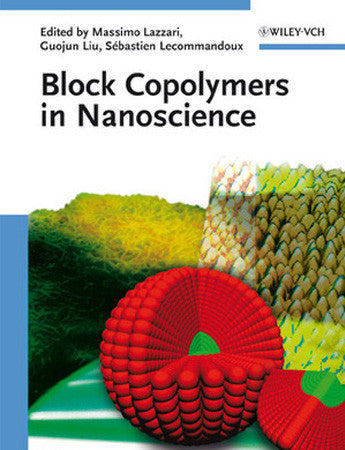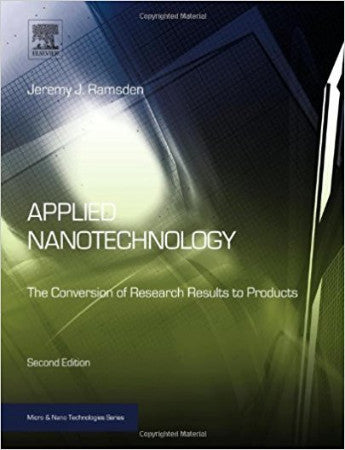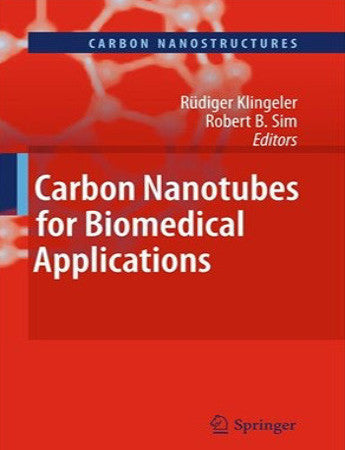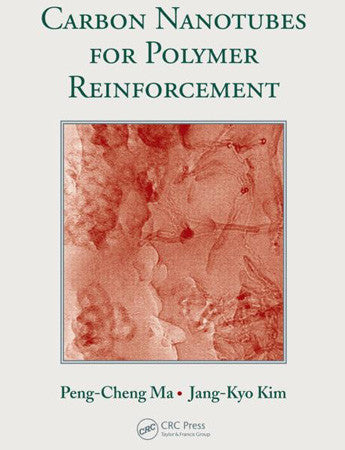Block Copolymers in Nanoscience
The book investigates all types of application for block copolymers: as tools for fabricating other nanomaterials, as structural components in hybrid materials and nanocomposites, and as functional materials. The multidisciplinary approach covers all stages from chemical synthesis and characterization, presenting applications from physics and chemistry to biology and medicine, such as micro- and nanolithography, membranes, optical labeling, drug delivery, as well as sensory and analytical uses.
An Introduction to Block Copolymer Applications: State-of-the-art and Future Developments.
2. Guidelines for Synthesizing Block Copolymers.
3. Block Copolymer Vesicles.
4. Block Copolymer Micelles for Drug Delivery in Nanoscience.
5. Stimuli-responsive Block Copolymer Assemblies.
6. Self-assembly of Linear Polypeptide-based Block Copolymers.
7. Synthesis, Self-assembly and Applications of Polyferrocenylsilane (PFS) Block Copolymers.
8. Supramolecular Block Polymers Containing Metal-Ligand Binding Sites: From Synthesis to Properties.
9. Methods for the Alignment and the Large-scale Ordering of Block Copolymer Morphologies.
10. Block Copolymer Nanofibers and Nanotubes.
11. Nanostructured Carbons from Block Coplymers.
12. Block Copolymers at Interfaces.
13. Block Copolymers as Templates for the Generation of Mesostructured Inorganic Materials.
14. Mesostructured Polymers-Inorganic Hybrid Materials from Blocked Macromolecular Architectures and Nanoparticles.
15. Block Ionomers for Fuel Cell Application.
16. Structure, Properties and Applications of Crystallizable ABA and ABC Triblock Copolymers with Hydrogenated Polybutadiene Blocks.
17. Basic Understanding of Phase Behavior and Structure of Silicone Block Copolymers and Surfactant-Block Copolymer Mixtures.
Subject Index.
2. Guidelines for Synthesizing Block Copolymers.
3. Block Copolymer Vesicles.
4. Block Copolymer Micelles for Drug Delivery in Nanoscience.
5. Stimuli-responsive Block Copolymer Assemblies.
6. Self-assembly of Linear Polypeptide-based Block Copolymers.
7. Synthesis, Self-assembly and Applications of Polyferrocenylsilane (PFS) Block Copolymers.
8. Supramolecular Block Polymers Containing Metal-Ligand Binding Sites: From Synthesis to Properties.
9. Methods for the Alignment and the Large-scale Ordering of Block Copolymer Morphologies.
10. Block Copolymer Nanofibers and Nanotubes.
11. Nanostructured Carbons from Block Coplymers.
12. Block Copolymers at Interfaces.
13. Block Copolymers as Templates for the Generation of Mesostructured Inorganic Materials.
14. Mesostructured Polymers-Inorganic Hybrid Materials from Blocked Macromolecular Architectures and Nanoparticles.
15. Block Ionomers for Fuel Cell Application.
16. Structure, Properties and Applications of Crystallizable ABA and ABC Triblock Copolymers with Hydrogenated Polybutadiene Blocks.
17. Basic Understanding of Phase Behavior and Structure of Silicone Block Copolymers and Surfactant-Block Copolymer Mixtures.
Subject Index.
Massimo Lazzari received his PhD in Macromolecular Chemistry at the University of Torino (Italy) under the supervision of Prof. O. Chiantore. After a two years postdoctoral work with Prof. K. Hatada at the Osaka University (Japan), where he learned the secrets of anionic polymerisation, in 1998 he became the assistant professor at the University of Torino, working on the characterisation and degradation of complex polymer systems. After several stays at the University of Santiago de Compostela (Spain), he is actually in the Institute of Technological Investigations. His current research interests are focused on the synthesis of self-assembling block copolymers, with a special attention on their use as templates and for the hierarchical self-assembly of metal nanoparticles. Guojun Liu received his PhD. degree from the University of Toronto in 1989. After 8 months as a post-doctoral fellow in the University of Toronto, he joined McGill University for another post-doctoral year. He was appointed assistant professor at the University of Calgary in 1990, promoted to associate professor in 1995 and full professor in 1999. Since 2004 he has been serving the Department of Chemistry at Queen's University as Tier I (senior) Canada Research Chair in Materials Science. He has published more than 100 papers mostly on block copolymer nanomaterials. Physico-chemist of formation, Sebasstien Lecommandoux has integrated the Centre de Recherche Paul Pascal (group of Professor Franz Hardouin, Bordeaux, France) in 1992 to prepare his Master and his Diploma Thesis in Chemistry and Physics (1996) on Liquid Crystal Polymers. Then, he went to the Material Research Laboratory and the Beckman Institute (University of Illinois at Urbana-Champaign, USA), as a Post-Doc in the group of Professor Samuel I. Stupp, and learned the Art of Supramolecular Chemistry from January to December 1998. He joined the Laboratoire de Chimie des Polymeres Organiques (CNRS, University of Bordeaux, France) as Associate Professor in 1998 and became Professor in 2005. He received the Bronze Medal Award from the CNRS in 2004 for the work he did on the self-assembly of polypeptide-based block copolymers. His current research interests mainly focus on macromolecular engineering via block copolymer self-assembly in solution and in bulk, with a special attention on the relationship between nanostructures and biological functions.




